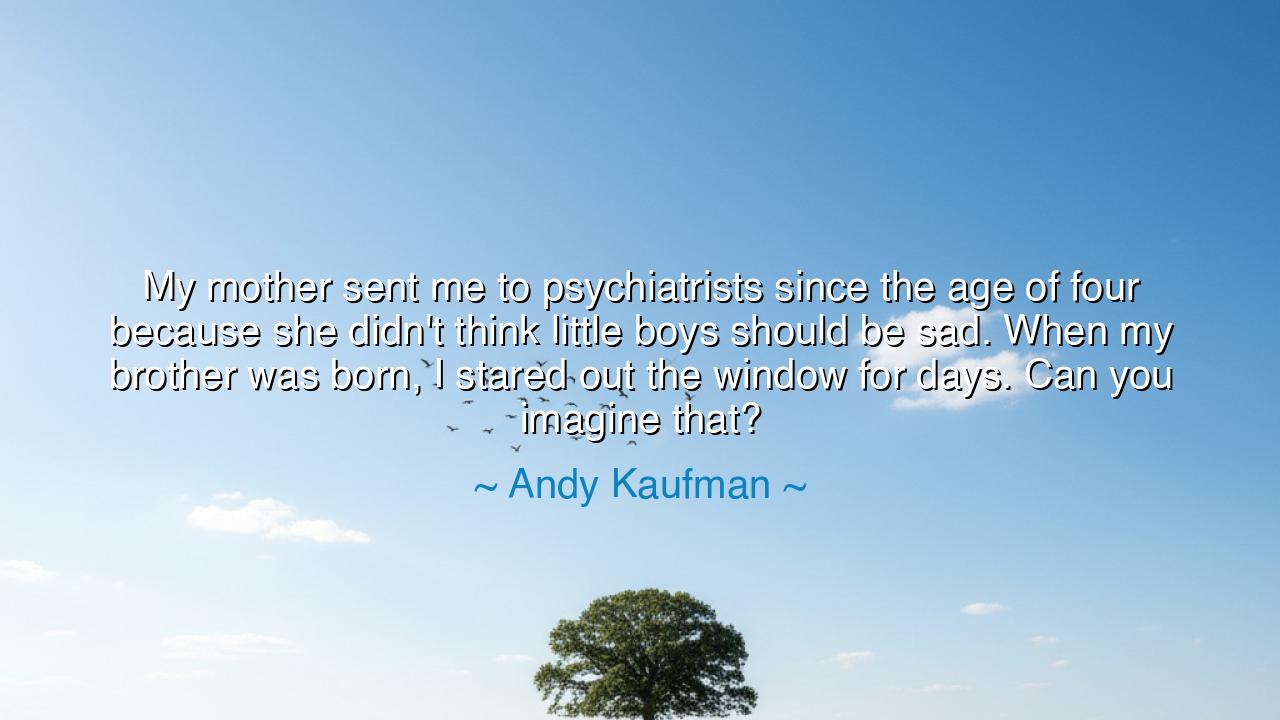
My mother sent me to psychiatrists since the age of four because
My mother sent me to psychiatrists since the age of four because she didn't think little boys should be sad. When my brother was born, I stared out the window for days. Can you imagine that?






“My mother sent me to psychiatrists since the age of four because she didn’t think little boys should be sad. When my brother was born, I stared out the window for days. Can you imagine that?” — so spoke Andy Kaufman, clown of paradox, jester of sorrow, prophet in disguise. In these words lies not only the memory of a man but the lament of countless children whose inner world is misunderstood. For in his voice we hear the ancient cry: “Do not silence the heart, for the heart too must speak.”
The child, tender as an uncut stone, does not yet know the weight of the world, but he knows the rivers of feeling that run through him. He knows joy, he knows grief, and he knows longing. Yet his mother, desiring to protect, sought to bind the tides, as if sorrow were shame, as if the sadness of a boy must be exiled. But sorrow is not exile—it is initiation. To stare through the window for days is not weakness, but the soul’s attempt to converse with infinity, to search beyond the walls of home for a horizon that might heal.
Consider the tale of Marcus Aurelius, emperor and stoic, who as a child lost his father and often sat in solitude, gazing into silence. His guardians might have urged him to laugh, to play, to banish the heaviness within, but instead he was taught to sit with thought, to grow familiar with sorrow. And from this companionship with silence arose one of the wisest rulers of Rome. Just as Marcus transformed solitude into strength, so too Kaufman’s sadness became the soil from which his strange, otherworldly comedy grew. For the man who had stared at the window as a boy would later make the world stare back at him, wondering where reality ended and play began.
The origin of this quote is thus the tension between love and misunderstanding. A mother, in fear, tried to cure what was never a disease. She could not see that the boy’s sadness was his sacred teacher. In every age, parents and societies have mistaken deep feeling for brokenness, and in doing so they have chained the gifts of their children. Yet from these chains, some children break free, and in their breaking they reveal a truth larger than themselves.
The wisdom here is sharp: to feel is not to fail. The heart is a vessel not only for laughter but also for grief, and the human soul is expanded not by the banishment of sorrow, but by its embrace. Just as fire tempers steel, so too does sorrow temper the spirit. To silence a child’s sadness is to rob him of his apprenticeship with life, but to honor it is to let him grow into one who can hold both laughter and tears as twin treasures.
Therefore, let us draw this lesson: if you are a parent, a teacher, a guardian—do not fear the shadows that cross a child’s face. Do not rush to erase them. Instead, sit with them, ask of them, learn from them. For these shadows are guides, and they often lead the child toward his true calling. If you are a seeker yourself, do not flee from your sadness. Gaze through it as Kaufman gazed through the window, for beyond the glass is a world that only sorrow’s eyes can see.
Practical action follows: practice the art of presence. When sorrow rises within you, do not drown it in noise. Write, paint, walk, or sit in silence. Let the feeling complete its journey. When you meet the sadness of another, do not dismiss it with hurried cures. Offer instead the medicine of listening, of patience, of companionship. In this way, you honor the sacred role of sorrow and turn what seems weakness into the root of wisdom.
And thus the teaching is sealed: the boy who once was sent to psychiatrists became the man who taught the world to laugh by showing them the strangeness of truth. His story tells us that even the most misunderstood pain can bear fruit, if we have the courage to face it. So let your sadness breathe, let your windows remain open, and you will find that what you once thought a burden is, in truth, a path toward greatness.






AAdministratorAdministrator
Welcome, honored guests. Please leave a comment, we will respond soon